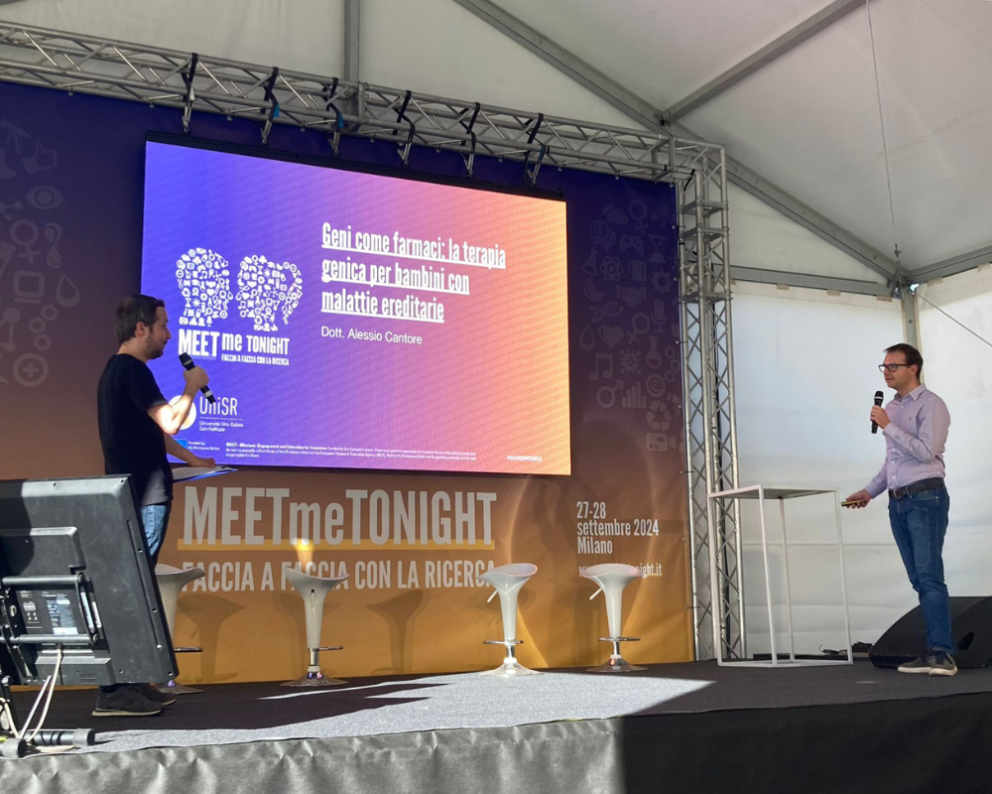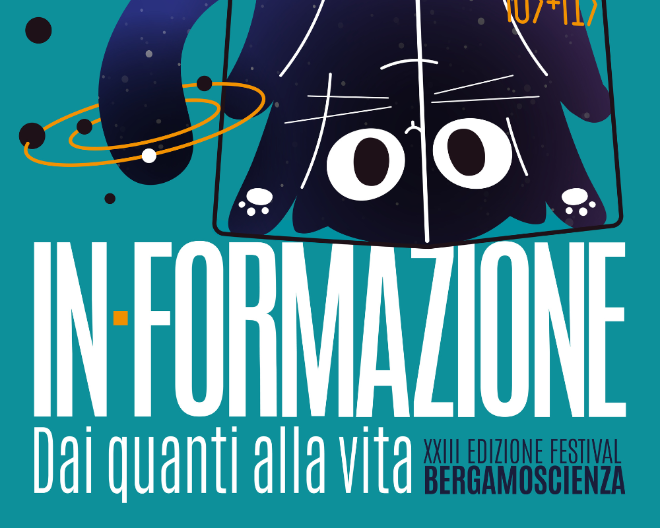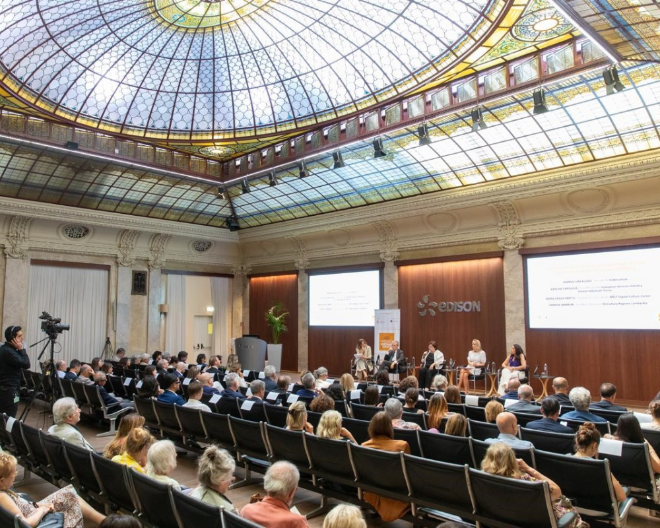MEETmeTONIGHT2025, the Milan event dedicated to science outreach
September 26–27

UniSR attend MEETmeTONIGHT with stands, talks, speed dates, and workshops.
On September 26–27, MEETmeTONIGHT returns to Milan, the event dedicated to science outreach as part of the European Researchers’ Night.
Organized in synergy by five Milanese universities – University of Milano-Bicocca, University of Milan, Bocconi University, Politecnico di Milano, and Vita-Salute San Raffaele University – together with formicablu, the initiative represents a unique opportunity to bring the public closer to the world of research, science, and innovation. The event is funded by the European project MEET, which, in addition to the Researchers’ Night, also includes activities dedicated to schools of all levels under the name MEETme@School, coordinated by UniSR.
The year 2025 marks the 20th anniversary of the European Researchers’ Night, the initiative promoted by the European Union that brings science closer to the general public every year, engaging hundreds of cities across Europe. This edition will involve more than 460 cities in 25 countries.
For the occasion, MEETmeTONIGHT returns to Milan: two days of activities, meetings, workshops, and performances, open to everyone, hosted this year by the University of Milan in via Festa del Perdono 7, right in the heart of the city.
UniSR at MEET
What’s happening at MEETmeTONIGHT? Here’s an overview of UniSR’s events.
For the full program of the entire initiative, you can visit the official website — but below you’ll find a focus on San Raffaele’s researchers, who will take part in all the different types of activities on offer.
TALKS
Discover science directly from its protagonists, in just 15 minutes.
Type 1 Diabetes and Stem Cells: A Dialogue Between Hopes and New Discoveries
Friday, September 26, 5:40 – 6:00 PM
Laura Monaco, Biologist (PhD student) – Diabetes Research Institute (DRI); Division of Immunology, Transplantation and Infectious Diseases
Between wishes, questions, and a magic lamp, the meeting between a patient and a researcher becomes an opportunity to explore how stem cells could offer a cure for type 1 diabetes.
Climate on the Mind: When Science Meets Emotions
Saturday, September 27, 4:40 – 5:00 PM
Giulia Gialdi, Researcher – Clinical Psychology and Psychotherapy, Department of Clinical Neurosciences; Health Directorate
Serena Giacomin, Physicist and Meteorologist, Italian Climate Network
What happens in our minds when we’re told that the climate is spiraling out of control? And what if it’s a climate scientist showing us the data? In this dialogue between climate science and psychology, we explore emotional reactions, barriers, and new possibilities.
DNA, Proteins and Other Molecules: How Omics Sciences Are Changing Medicine
Saturday, September 27, 5:00 – 5:20 PM
Gianfranco Frigerio & Chiara Ansermino, Researchers – Pro.Mi.Fa Proteomics Service; Center for Translational Genomics and Bioinformatics
Genomics, transcriptomics, proteomics, and metabolomics are increasingly used to understand how our bodies work and what happens when they get sick. A talk to discover how these approaches are leading us toward increasingly personalized medicine.
More Precise Treatments for Lung Cancer
Saturday, September 27, 5:20 – 5:40 PM
Giorgia Foggetti, Researcher – Project Leader (OSR), Lecturer (UniSR); Department of Oncology, Lung Cancer Research
Virginia Guzzeloni, PhD Student
The discovery of new tumor-cell-specific markers can help develop more precise and less harmful treatments, aiming to improve patients’ lives. A talk to learn more about targeted therapies for lung cancer.
Inside Clinical Research
Saturday, September 27, 5:40 – 6:00 PM
Elena Incerti, Clinical Trial Center
A clinical researcher takes us behind the scenes of her work: a fascinating, detective-like activity made up of data, people, and questions. The goal? To understand whether a drug or treatment works, how safe it is, and for whom.
Artificial Intelligence in Medicine: Integration or Revolution?
Saturday, September 27, 6:00 – 6:20 PM
Alberto Traverso, Scientific Director of the S-Race Data Science Group, Center of Excellence in Artificial Intelligence, Faculty of Medicine, UniSR
Will artificial intelligence revolutionize medicine or make medical work redundant? From the usefulness of algorithms in clinical practice to trust in automated decisions: a surgeon and an AI expert tackle the dilemma.
0/resolutions/res-l1920x10000/MEET-2025_UniSR_Notte-ricerca-(4)0.jpg)
WORKSHOPS
Workshops are limited-capacity activities and require free booking through this website.
Different from Whom? A Workshop to Explore the Concept of Normality and Its Fragilities
Saturday, September 27, 10:00 – 1:00 PM
Francesco Attanasio, Researcher – Psychiatrist; Department of Clinical Neurosciences
Who decides what is “normal”? In this interactive workshop, young people and adults will explore images and stories that challenge conscious or intuitive definitions of normality and abnormality. An opportunity to reflect together on implicit biases and the subtle boundaries between health, diversity, and illness. Duration: 1 hour.
Medicine and AI: An Interactive Experience Through Questions and Clinical Cases
Saturday, September 27, 2:00 – 6:00 PM
Simone Barbieri, Researcher – PM AI; Experimental Imaging Center
How important is it to understand what happens “inside” an AI model? Will doctors who use AI replace those who don’t? What are AI model “hallucinations” and how can we recognize and explain them? Join the discussion on these and other questions, and try the web app developed at San Raffaele to address a real clinical case. Duration: 1 hour.
/resolutions/res-l1920x10000/MEET-2025_UniSR_Notte-ricerca-(1).png)
PAVILIONS
One of the new features of the 2025 edition of MEETmeTONIGHT will be the thematic pavilions dedicated to the five Horizon Europe missions. These pavilions will include exhibition paths and hands-on activities designed to engage the public. You can find our researchers at the Beating Cancer pavilion.
The Puzzle of Care: From Molecular Therapy to Precision Immunotherapy
Saturday, September 27, 10:00 AM – 8:00 PM
Antonella Santoro & Simona Fusco (Researchers – Postdoc and PhD Student; Senescence in Stem Cell Aging, Differentiation and Cancer Unit, Tiget)
Mara Salomè (Researcher – Postdoc Gene Expression Regulation, Division of Genetics and Cell Biology, MSCA fellow 2020–2022)
Every patient is different, and no tumors are identical. For some, treating cancer as effectively as possible requires a personalized, tailor-made approach. Through interactive activities, we explain in a simple and engaging way how immunotherapy and molecular therapy work — two innovative treatments in oncology.
You at the Center Every Day: Health Pathways
Saturday, September 27, 10:00 AM – 8:00 PM
Federica Invernizzi (Hepatologist and Gastroenterologist, Head of the Medical Hepatology Unit and Clinical Coordinator of the Genos Project)
Maria Teresa Lupo-Stanghellini (Adjunct Professor – Subject Expert; ref. School of Hematology Specialization; Department of Onco-Hematology)
Do we really know what is good for us and what can harm us? This pavilion guides the public through cancer prevention via diet and lifestyle choices. The format takes a dynamic and engaging approach to raise awareness of a healthy and preventive lifestyle. Caring for quality of life goes far beyond asking “how are you?” It includes physical, emotional, cognitive, social, and functional dimensions. The pavilion also features testimonials from patients and caregivers throughout the therapy and health journey. Care cannot focus solely on the disease: we take care of patients and their loved ones in a 360° approach.
/resolutions/res-l1920x10000/MEET-2025_UniSR_Notte-ricerca-(4).png)
SPEED DATES
Speed dates are moments designed to allow direct and informal conversations with early-career scientists. PhD students, in 15-minute sessions, are available for one-on-one questions with the public.
Saturday, September 27, 12:00 – 6:00 PM
Margherita Ghiara, PhD student in Philosophy – She studies philosophy of science and epistemology, focusing on scientific misinformation and its intersection with politics and digital media. Her project combines field experiments, citizen science, and the analysis of cognitive mechanisms underlying how young people evaluate information.
Marco Montagna, PhD student in Molecular Medicine – Clinical and Experimental Medicine; an internist and researcher, he focuses on hospital-territory integration, multimorbidity management, and AI in medicine (supported by a doctoral fellowship from Porini S.r.l.).
/resolutions/res-l1920x10000/MEET-2025_UniSR_Notte-ricerca-(3).png)
EU CORNER
The EU Corner is a sharing space for researchers funded by the European Union, particularly through the Marie Skłodowska-Curie Actions and ERC programs. During their sessions, researchers present and discuss their work.
Can a “Broken” Gene Be “Repaired”? Gene Therapies for Liver Cells: How, When, Where, and Why
Saturday, September 27, 11:00 – 11:20 AM
Alessio Cantore
Can a “broken” gene be “repaired”? We will explore this together, discussing gene modification for therapeutic purposes — gene therapy. Our target is liver cells. If something in these cells malfunctions due to a defect in a single gene, it can cause a disease that often appears in the first months or years of life. We study both how to repair non-functioning genes and the cells to be treated, aiming to develop new therapies for diseases that are currently incurable.
The Function of Liver T Regulatory (Treg) Cells in Health and Disease (talk in English)
Saturday, September 27, 12:00 – 12:20 PM
Caitlin Abbott
This study aims to elucidate the role of Treg cells in the regulation of immune responses during chronic metabolic-associated steatohepatitis (MASH). This disease can be driven by diet and lifestyle factors in humans and is associated with inflammation and dysregulated immune responses, however, the role of Treg cells remains understudied. Using a model of MASH combined with targeting of Treg cells, we were able to observe changes in T cell responses and whole organism metabolism. This highlights the association between Treg function, metabolism, and MASH progression which we will explore further.
Modifier Genes: New Perspectives for Muscular Dystrophy
Saturday, September 27, 3:40 – 4 PM
Veronica Pini
Muscular dystrophy is a genetic disease caused by defects in genes that prevent the production of proteins essential for muscle strength. Beyond the main gene, other modifier genes can influence disease progression, either worsening or slowing it. Some patients, thanks to protective genes, maintain the ability to walk longer or experience less heart damage. Studying these genes helps explain different clinical outcomes and opens new therapeutic perspectives.
Walking Again? The Challenge of Paraplegia: Science and Innovation in Spinal Cord Electrical Stimulation
Saturday, September 27, 5:20 – 5:40 PM
Luigi Albano
Can the spinal cord function again after being damaged? We will explore this question by discussing spinal cord electrical stimulation, a technology capable of reactivating residual neural circuits and promoting the restoration of leg movement after a spinal cord injury. Thanks to this technique, some patients have been able to stand up and take their first steps. It is not yet a definitive cure, but it represents a concrete hope for those who dream of walking again.
Targeted Strategies for Acute Lymphoblastic Leukemia
Saturday, September 27, 6:40 – 7:00 PM
Mara Salomè
Acute lymphoblastic leukemia (ALL) is the most common cancer in children. While most cases are currently treatable, some patients do not respond to chemotherapy and may experience relapses. For these patients, it is necessary to develop therapies targeting the specific molecular drivers of the disease. This approach aims to achieve more effective and less toxic treatments in the future, targeting only the cancer cells while sparing healthy tissue.
You might be interested in

Intrecci: a UniSR project for more inclusive and accessible cancer diagnosis

The XXIII edition of the BergamoScienza Festival kicks off

The Impact of Knowledge: UniSR’s Role in the National and European Context

